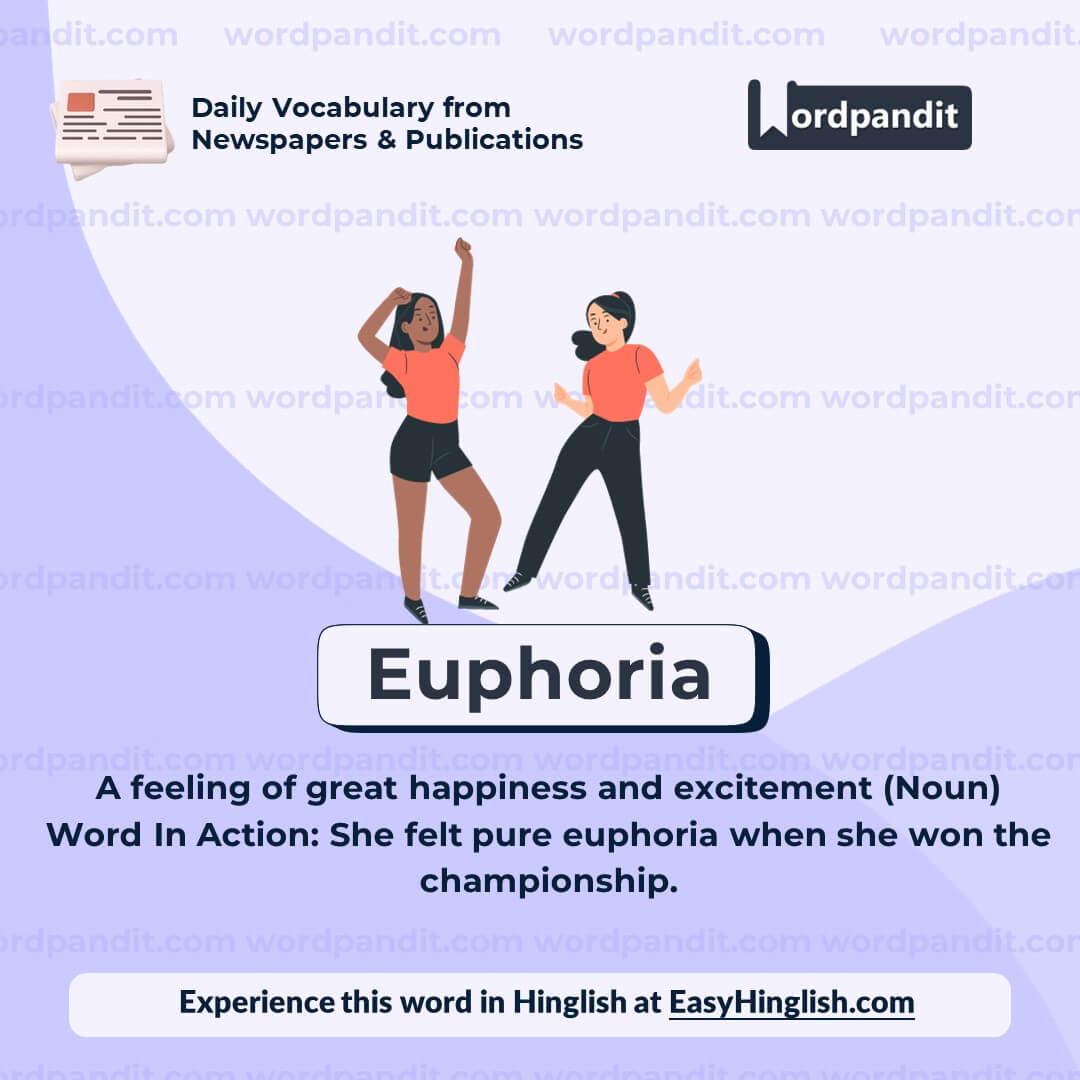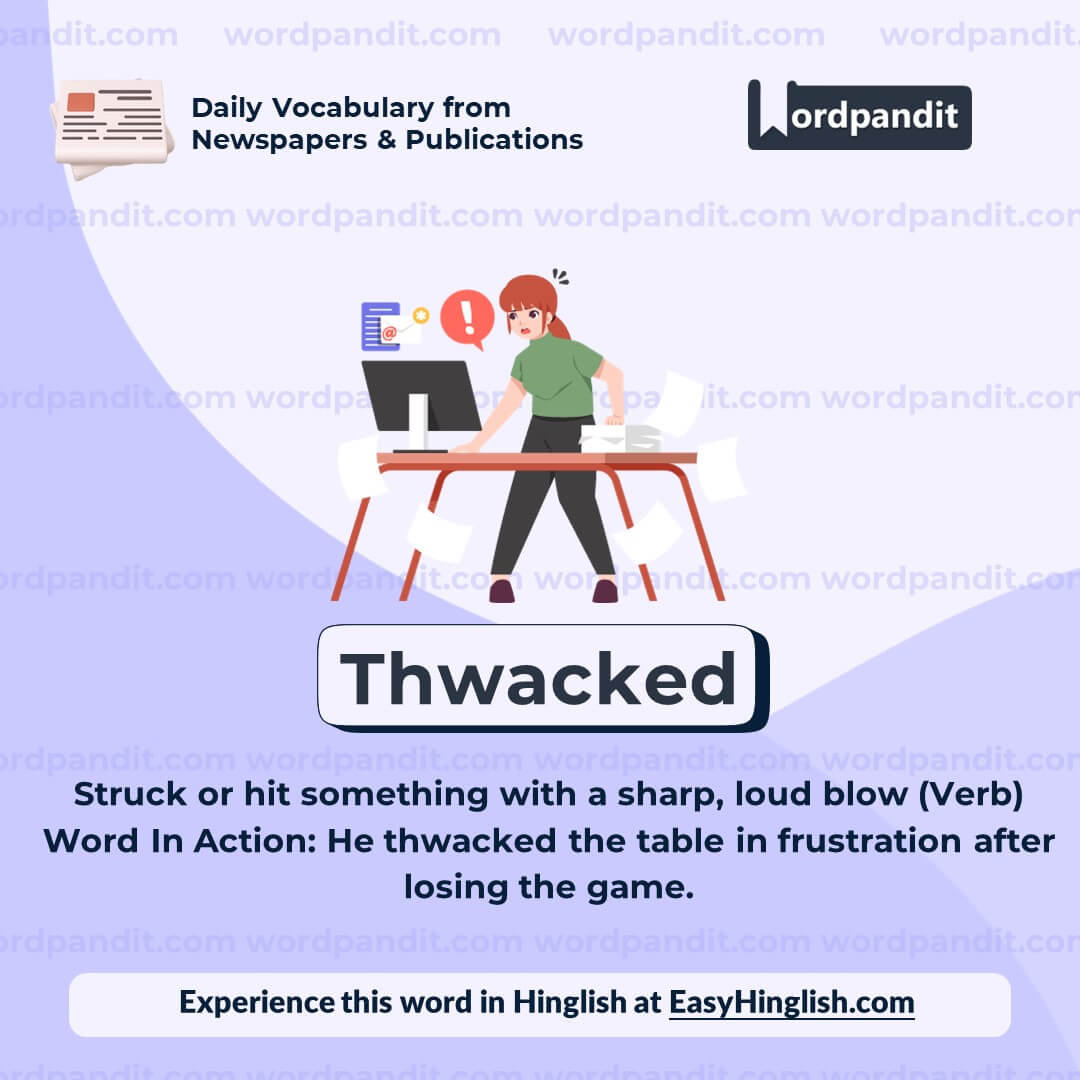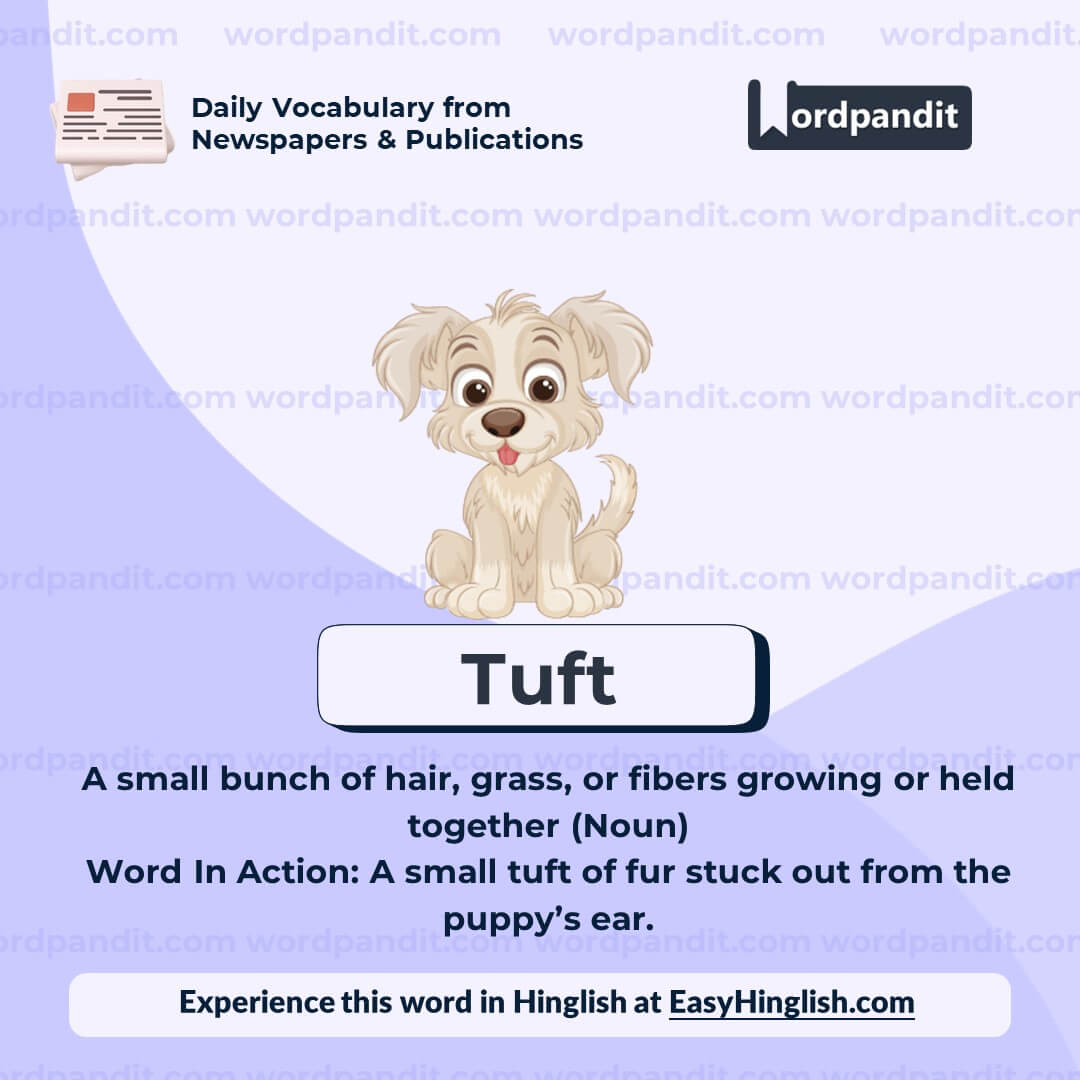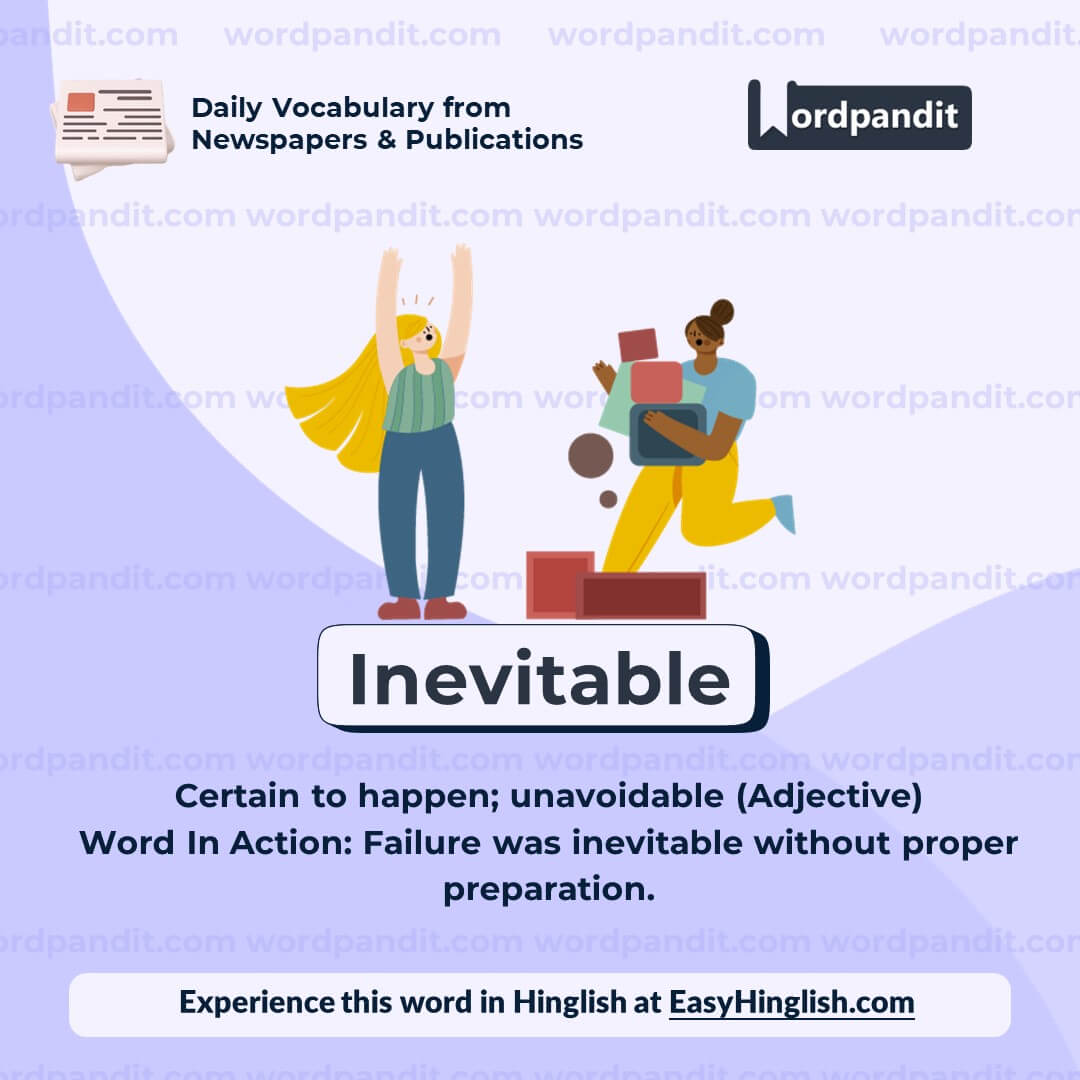Daily Vocabulary from International Newspapers and Publications
Expand Your Vocabulary with Wordpandit’s Global Vocabulary Hub
At Wordpandit, we are committed to helping you develop a truly global vocabulary by drawing from some of the most respected international publications. This section is designed to keep you ahead of the curve by introducing you to words that define global conversations and trends.
The Power of Global Sources
To help you think and communicate on a global scale, we curate vocabulary from renowned international sources, such as:
- The New York Times
- The Washington Post
- BBC
- The Guardian
- The Economist
- Scientific American
- Psychology Today
- And many more...
Stay Global, Stay Competitive
Our daily updates from international publications ensure you are consistently exposed to new words that reflect global news and developments, making sure your vocabulary is not only current but also globally relevant.
Enhance Your Global Perspective
Whether you’re preparing for international exams, aiming to excel in global business communication, or want to enhance your language skills for personal growth, Wordpandit offers the resources you need to thrive in a global context.
Effective Learning, Global Reach
Our learning methodology combines global examples, memory aids, and interactive activities, allowing you to internalize new words effectively and apply them in real-world scenarios.
Begin Your Global Vocabulary Journey Now!
Why Choose Wordpandit?
Practical Learning: Focus on words you'll actually encounter in real-world reading, enhancing your comprehension and communication skills.
Diverse Content: From current affairs to scientific breakthroughs, our varied sources expose you to vocabulary across multiple domains.
Effortless Integration: Make Wordpandit a part of your daily routine. Just a few minutes each day can significantly boost your lexicon over time.
Your Path to Vocabulary Mastery
- Visit our Daily Vocabulary section regularly
- Explore new words and their usage in context
- Practice incorporating these words into your own writing and speech
- Track your progress as your vocabulary expands
Start Your Journey Today
Embark on your vocabulary enhancement journey with Wordpandit. By consistently engaging with our daily posts, you'll build a robust vocabulary that serves you well in academic, professional, and personal contexts.
Remember, a word a day keeps linguistic limitations at bay. Make Wordpandit your daily companion in the quest for vocabulary excellence!
WORD-1: Euphoria
Context:
"Once I’d stepped out of the building, the euphoria of the party took all of two seconds to fade." - Aeon
Explanatory Paragraph:
"Euphoria" describes a feeling of intense happiness, excitement, or elation, often beyond what is normally expected. It can be triggered by joyous occasions, achievements, or even chemical influences. However, this sensation is usually temporary, as reality sets back in once the excitement fades.
Meaning: A feeling of great happiness and excitement (Noun)
Pronunciation: yoo-FOR-ee-uh
Difficulty Level: ⭐⭐⭐ Intermediate
Etymology: Derived from Greek "euphoría," meaning "a state of well-being," from "eu-" (well) and "pherein" (to bear or carry).
Synonyms & Antonyms:
Synonyms: Elation, bliss, exhilaration, joy, ecstasy
Antonyms: Despair, misery, sadness, melancholy
Usage Examples:
- The team erupted in euphoria after scoring the winning goal in the final seconds of the match.
- She felt a wave of euphoria when she received the acceptance letter from her dream university.
- The festival created an atmosphere of pure euphoria, with music and dancing filling the streets.
- His euphoria from the unexpected promotion quickly turned into anxiety about the added responsibilities.
Cultural Reference:
"Euphoria" is also the title of a popular television series that explores the intense highs and lows of teenage life, relationships, and self-discovery.
Think About It:
Can experiencing euphoria influence decision-making, and if so, how?
Quick Activity:
Write about a personal experience where you felt a moment of euphoria. What caused it, and how long did it last?
Memory Tip:
Think of "Euphoria" as "EU" (good) + "phoria" (feeling) – a good feeling!
Real-World Application:
"Euphoria" is commonly used in contexts like sports victories, personal achievements, and artistic performances, where moments of extreme happiness occur.
WORD-2: Thwacked
Context:
"I could just make out the contours of a motorbike scooting towards me at full speed. Before I knew it, a hand had thwacked my chest." - Aeon
Explanatory Paragraph:
"Thwacked" describes the action of hitting something with a sharp, forceful blow, often producing a distinct sound. It conveys a sudden and sometimes unexpected impact, typically associated with a sense of abruptness or aggression. The word is often used in casual speech or storytelling to add a sense of drama and immediacy.
Meaning: Struck or hit something with a sharp, loud blow (Verb)
Pronunciation: thwak-t
Difficulty Level: ⭐⭐ Beginner
Etymology: Originated in the early 16th century, possibly imitative of the sound produced by a sharp blow.
Synonyms & Antonyms:
Synonyms: Smacked, slapped, whacked, pounded, walloped
Antonyms: Caressed, stroked, patted, tapped
Usage Examples:
- He thwacked the baseball with all his strength, sending it soaring over the fence.
- She thwacked the mosquito on her arm before it could bite her.
- The boxer thwacked his opponent with a powerful right hook.
- Annoyed, he thwacked the newspaper onto the table and sighed.
Cultural Reference:
Classic comic books often use words like "Thwack!" to illustrate fight scenes, making the impact of punches and hits more dynamic and engaging.
Think About It:
Why do you think sound-based words like "thwacked" make writing more engaging?
Quick Activity:
Come up with a short action scene where someone or something gets "thwacked." Try to use vivid details to make the moment feel dramatic.
Memory Tip:
Think of the sound "THWACK!" when a book slams shut—quick, loud, and sudden.
Real-World Application:
"Thwacked" is useful in storytelling, sports commentary, and everyday speech to describe impactful hits or actions with sound effects.
WORD-3: Tuft
Context:
"Tuft of hair on top, double chin bulging from the bottom, the offending arm held out like a weapon." - Aeon
Explanatory Paragraph:
A "tuft" refers to a small, clumped bunch of hair, grass, or fibers that grow or are grouped together. It is often used to describe a distinct patch that stands out from its surroundings, such as a tuft of fur on an animal or a tuft of hair sticking up on a person’s head.
Meaning: A small bunch of hair, grass, or fibers growing or held together (Noun)
Pronunciation: tuhf-t
Difficulty Level: ⭐⭐ Beginner
Etymology: From Old French "touffe," meaning a clump of hair or foliage, and from Latin "tufa."
Synonyms & Antonyms:
Synonyms: Clump, bunch, cluster, sprig
Antonyms: Smoothness, baldness, flatness
Usage Examples:
- The cat had a tuft of white fur on its tail, making it look even fluffier.
- A small tuft of grass grew between the cracks in the pavement.
- Despite his baldness, a single tuft of hair stubbornly remained at the back of his head.
- The wind ruffled the tuft of feathers on the baby bird’s head.
Cultural Reference:
The Lorax, a famous character from Dr. Seuss’s book, is often recognized by his bushy mustache, which can be described as a tuft of hair.
Think About It:
How do tufts of hair or fur help animals in nature?
Quick Activity:
Describe an animal using the word "tuft" in a sentence. Try to make the description as vivid as possible.
Memory Tip:
Think of a tuft as a "tiny puff" of hair or grass that sticks out.
Real-World Application:
"Tuft" is commonly used in descriptions of nature, animals, and personal appearance, especially when referring to hair or fur that stands out in a noticeable way.
WORD-4: Inevitable
Context:
"The rapid advancement of technology made the automation of many jobs inevitable, leaving workers to adapt to new roles." - Aeon
Explanatory Paragraph:
"Inevitable" refers to something that is certain to happen and cannot be avoided. It often carries a sense of fate or necessity, implying that regardless of efforts to prevent it, the outcome is unavoidable. This word is frequently used in discussions about change, progress, or consequences.
Meaning: Certain to happen; unavoidable (Adjective)
Pronunciation: in-EV-i-tuh-bul
Difficulty Level: ⭐⭐⭐ Intermediate
Etymology: From Latin "inevitabilis," meaning "unavoidable," composed of "in-" (not) and "evitabilis" (avoidable).
Synonyms & Antonyms:
Synonyms: Unavoidable, certain, inescapable, destined
Antonyms: Avoidable, uncertain, preventable, optional
Usage Examples:
- With dark clouds gathering, rain seemed inevitable.
- After years of reckless spending, bankruptcy became an inevitable consequence.
- As technology evolves, automation in industries is inevitable.
- Aging is an inevitable part of life that everyone must accept.
Cultural Reference:
In the movie *Avengers: Endgame*, the villain Thanos famously declares, "I am inevitable," signifying his belief that his victory is unavoidable.
Think About It:
Do you believe that all technological advancements are inevitable, or can society control their pace?
Quick Activity:
Write a short paragraph using "inevitable" to describe a situation where change was unavoidable.
Memory Tip:
Think of "inevitable" as "in-evade-able"—something you cannot evade or escape.
Real-World Application:
"Inevitable" is commonly used in discussions about economics, technology, politics, and life changes, emphasizing situations where outcomes are certain.
WORD-5: Aegis
Context:
"The environmental project was launched under the aegis of the United Nations, ensuring it received global support and resources." - Aeon
Explanatory Paragraph:
"Aegis" refers to protection, support, or sponsorship provided by a powerful organization or individual. The term originates from Greek mythology, where the "aegis" was the shield of Zeus, often associated with divine protection. Today, it is commonly used to indicate guidance or backing from an authoritative entity, such as a government, institution, or influential figure.
Meaning: Protection, sponsorship, or support of a powerful organization or individual (Noun)
Pronunciation: EE-jis or AY-jis
Difficulty Level: ⭐⭐⭐ Intermediate
Etymology: From Greek "aigis," meaning "shield of Zeus," symbolizing divine protection and authority.
Synonyms & Antonyms:
Synonyms: Protection, sponsorship, backing, patronage, guidance
Antonyms: Vulnerability, exposure, neglect, abandonment
Usage Examples:
- The research program was conducted under the aegis of a prestigious university.
- The peace talks continued under the aegis of the United Nations.
- The museum was built under the aegis of a wealthy philanthropist who supported the arts.
- The local festival thrived under the aegis of the city's cultural department.
Cultural Reference:
In Greek mythology, the aegis was a shield carried by Zeus and Athena, often depicted with the head of Medusa, symbolizing divine protection and power.
Think About It:
Why do organizations and governments often launch projects under the aegis of well-known institutions? How does it impact public trust?
Quick Activity:
Write a sentence using "aegis" to describe a situation where an individual or group benefits from authoritative support.
Memory Tip:
Think of "aegis" as a "shield" of protection, just like in Greek mythology.
Real-World Application:
"Aegis" is frequently used in politics, business, and academia to indicate official backing, protection, or support from an influential entity.

















